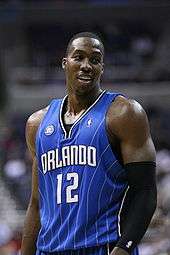NBA high school draftees
The NBA high school draftees are players who have been drafted to the National Basketball Association (NBA) straight out of high school without playing basketball at the collegiate level. The process of jumping directly from high school to the professional level is also known as going prep-to-pro. Since 2006, the practice of drafting high school players has been prohibited by the new collective bargaining agreement, which requires that players who entered the draft be 19 years of age and at least one year removed from high school.[1] Contrary to popular belief, the player does not have to play at least a year in college basketball: the player can choose to instead play in another professional league (like the NBA G League or especially somewhere overseas) like Brandon Jennings or Emmanuel Mudiay in Italy and China respectively; simply take the year off, as Mitchell Robinson and Darius Bazley did; or even hold themselves back a year in high school before declaring for the draft, like with Satnam Singh Bhamara or Thon Maker.
The NBA has long had a preference for players who played basketball at the collegiate level;[2] the vast majority of players to play in the NBA have had college experience. However, there have been numerous notable players who attended high school in the United States and then joined the NBA without playing college basketball.
History
Early years
In the early years of the NBA draft, a player had to finish his four-year college eligibility to be eligible for selection. Reggie Harding, who had graduated from high school but did not enroll in a college, became the first player drafted out of high school when the Detroit Pistons selected him in the fourth round of the 1962 draft.[3] However, the NBA rules at that time prohibited a high school player to play in the league until one year after his high school class graduated.[4][5] Thus, he spent a year playing in a minor basketball league before he was drafted again in the 1963 draft by the Pistons.[6] He finally entered the league in the 1963–64 season and played four seasons in the NBA and American Basketball Association (ABA).[7]
In 1971, the U.S. Supreme Court decision Haywood v. National Basketball Association ruled 7–2 against the NBA's requirement that a player must wait four years after high school graduation (which in most cases was spent playing in college) before turning professional. This ruling allowed players to enter the NBA Draft without four years of college, provided they could give evidence of hardship to the NBA office.[8]
In 1974, the NBA's rival, the ABA, drafted high school star Moses Malone. He was immediately signed by the Utah Stars and became the first player to go directly from high school basketball to a professional league.[9] He became an instant success, averaging 18 points and 14 rebounds per game in his rookie season. He played in the ABA until the ABA–NBA merger in 1976. He then played 19 successful seasons with 7 NBA teams. He won the NBA championship, along with the Finals Most Valuable Player Award, with the Philadelphia 76ers in 1983. His other achievements include 3 Most Valuable Player Awards, 12 consecutive All-Star Game selections, 8 All-NBA Team selections and 6 rebounding titles. He has been inducted to the Naismith Memorial Basketball Hall of Fame and was also named in the 50 Greatest Players in NBA History list announced at the league's 50th anniversary in 1996.[10]
A year later, two high school players, Darryl Dawkins and Bill Willoughby, applied for hardship and were declared eligible to be selected in the 1975 draft.[11] They had applied and gave evidence of financial hardship to the league, which granted them the right to start earning a living by starting their professional careers earlier.[8] Dawkins was selected 5th by the Philadelphia 76ers while Willoughby was selected 19th by the Atlanta Hawks. Dawkins played 14 seasons and averaged 12 points and 6 rebounds per game. Willoughby played 8 seasons with 6 different teams and averaged only 6 points per game. Neither player reached the level of success that was expected. It is argued that they could have been better players if they had college basketball experience before entering the NBA.[12][13][14]
After Dawkins and Willoughby, no high schoolers were drafted for 14 years, though several players entered the league without playing college basketball. One player, Shawn Kemp, enrolled in college but never played any games due to personal problems. In 1989, a year after his high school graduation, he was drafted by the Seattle SuperSonics.[15] He played 14 seasons in the NBA and was selected to 6 All-Star Games and 3 All-NBA Teams.[16]
1995–2005
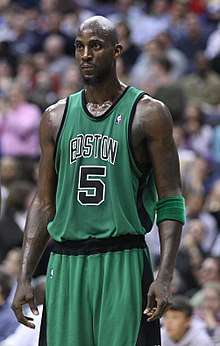
In 1995, Kevin Garnett, USA Today's high school basketball player of the year, announced his intentions to forgo college, and declared himself eligible for the 1995 NBA draft. The move was highly controversial; the conventional wisdom at the time was that high-schoolers were neither emotionally nor physically mature enough for the rigors of the NBA game. On draft day, Garnett was selected with the #5 pick in the first round by the Minnesota Timberwolves. Garnett led the Timberwolves to eight consecutive playoff berths and was a multiple All-Star during his time with the team. In 2004, the Wolves advanced to the Western Conference Finals before losing to the Lakers; Garnett was named Most Valuable Player that year. After a trade in the 2007 offseason to the Boston Celtics, he was a core player in the Celtics' first NBA title in over 20 years.
In 1996, two notable players made the jump from high school to the NBA. The first was Kobe Bryant, selected by the Charlotte Hornets with the 13th pick of the NBA draft, but traded almost immediately to the Los Angeles Lakers. The second was Jermaine O'Neal, selected by the Trail Blazers with the 17th pick. O'Neal was traded in 2000 to the Indiana Pacers (and later to the Miami Heat). In 1997, another All-Star caliber player, Tracy McGrady, was selected by the Toronto Raptors. In 1998, three high-schoolers were drafted with Al Harrington and Rashard Lewis experiencing the most success. Darius Miles became the highest high school player selected with the third pick in the 2000 NBA Draft, until the following year.
In 2001, Kwame Brown (selected by the Washington Wizards) became the first high-schooler to be selected with the number one pick in the draft; since then, LeBron James (2003) and Dwight Howard (2004) have also been selected with the first pick. Other notable high-schoolers include Tyson Chandler and Eddy Curry (2001); Amar'e Stoudemire (2002); Josh Smith, Sebastian Telfair, J. R. Smith, and Shaun Livingston (2004); Andrew Bynum and Monta Ellis (2005).
Many prep-to-pro players like Kevin Garnett, Kobe Bryant, Jermaine O'Neal, LeBron James, and Tracy Mcgrady went on to become star players in the NBA. Kevin Garnett, Kobe Bryant, LeBron James have all won the league's MVP Award; as well as holding at least one NBA title under their belt, and are widely regarded as future Hall-of-Famers. Dwight Howard, Jermaine O'Neal and Amar'e Stoudemire also became perennial All-Stars in their prime. However, not all high-schoolers were successful. Kwame Brown and Eddy Curry are widely regarded as draft busts, while Jonathan Bender and Darius Miles had their careers cut short by injury. Korleone Young (drafted in 1998) and Leon Smith (drafted in 1999) only played a handful of games in the NBA, while Lenny Cooke and DeAngelo Collins, both of whom declared for the 2002 Draft, went undrafted and never played in the NBA.
2005–2018
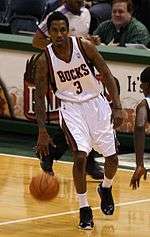
Beginning 2005, both the NBA and the players' union started to discuss the possibility of implementing a new age limit. The league lobbied for an age minimum of 20 while the union was against an age limit.[17] Finally in July 2005, both sides compromised in the new collective bargaining agreement, requiring that the minimum age for entry into the NBA be 19 and that entrants be at least one year removed from high school.[18] For the first time, teams are also allowed to send players, with two years of NBA experience or less, to the NBA Development League (NBA D-League).[17]
The terms of the new agreement ended the practice of drafting high school players, starting in the 2006 Draft. A high school player must wait at least a year to be eligible for selection. However, they are not required to spend that year in college. In 2008, high school star Brandon Jennings decided to skip college and play professional basketball in Italy. After a year, he was eligible for the 2009 draft and was selected 10th by the Milwaukee Bucks.[19] In the 2010 draft, Latavious Williams, who did not qualify academically to go to college, spent a year playing in the NBA D-League before he was drafted in the second round.[20] Emmanuel Mudiay decided to take a route similar to that of Jennings by skipping college to play professionally in China in 2014 before being selected 7th by the Denver Nuggets a year later. Terrance Ferguson also opted out of college for professional play, this time in Australia in 2016 before being selected a year later by the Oklahoma City Thunder as the 21st pick of the 2017 draft.
While the rules discouraged high school players from entering, starting in the early 2010s, more high schoolers opted to declare entry for the draft with the intent of being selected early. In the 2015 draft, Indian-born Satnam Singh Bhamara, who did not qualify academically to go to college, went straight to the NBA draft as a post-graduate after being at IMG Academy for five years. He would be taken by the Dallas Mavericks with the 52nd pick in the draft, thus becoming the first high school student to be drafted since the rule changes. In the 2016 draft, one of the Top–10 players that was declared eligible for NCAA play in 2016, Thon Maker, decided to enter the draft instead as a post-graduate from Orangeville Prep in Orangeville, Ontario, Canada due to him originally declaring himself as eligible for college in 2015. Thon also marked the first player to be drafted directly from a Canadian high school, as well as the second player to enter as a post-graduate. He was the first high schooler to be drafted in the first round since 2005, being drafted by the Milwaukee Bucks with the tenth pick, becoming the first high school lottery pick since 2005. In the 2018 draft, Anfernee Simons from the IMG Academy was also drafted in the NBA with the 24th, with Simons being a postgraduate there like Bhamara three years prior. In addition, Mitchell Robinson took a year off after high school due to exiting Western Kentucky University early without playing there, which left him drafted as the 36th pick. Most recently, in 2019, both Jalen Lecque and Darius Bazley declared entry and left their names in the draft, with Bazley entering without any collegiate or professional play after graduating from high school the previous year. Darius Bazley was selected as the 23rd pick of that year's draft by the Oklahoma City Thunder, while Jalen Lecque went undrafted, but played for the Phoenix Suns during the 2019–20 NBA season.
Some players support the new age limit. Gerald Green called it "a smart move", saying that "[not everybody is] LeBron James ... He came in ready and he dominated the league. There's a lot of players that have to get developed. Me, I've got to get developed. But I guess that age limit, that one year of college experience, can get you more developed and I think that's pretty good."[17] Others, however, strongly criticize the rule. Andrew Bynum said "That's something I'll never understand. Because in no other business can the owner, or a stock trader, or a CEO of a company try to protect themselves by putting rules like that."[21] Former Florida Gators and current Oklahoma City Thunder head coach Billy Donovan believed that the rule made high schoolers feel like they were being punished.[22]
In December 2009, a recent report suggested that the NBA was looking to reverse their original ruling from 2005 to go back to having the age limit be 18 years old. If implemented, this would allow for players to enter the NBA directly from high school without any stipulations whatsoever.
List
There have been 45 high school draftees in the NBA Draft. Three draftees were selected first overall; Kwame Brown in 2001 NBA draft, LeBron James in 2003, and Dwight Howard in 2004 NBA draft. Two draftees went on to win the Rookie of the Year Award in their first season: LeBron James and 2002 draftee Amar'e Stoudemire.[23] Three draftees went on to win the Most Valuable Player Award: Kevin Garnett in 2004, Kobe Bryant in 2008, and LeBron James in 2009, 2010, 2012, and 2013.[24] Ten draftees have been selected to the All-Star Game and ten draftees have been selected to the All-NBA Team.
| Pos. | G | F | C |
| Position | Guard | Forward | Center |
| ^ | Denotes player who has been inducted to the Naismith Memorial Basketball Hall of Fame |
| * | Denotes player who has been selected for at least one All-Star Game and All-NBA Team |
| + | Denotes player who has been selected for at least one All-Star Game |
| # | Denotes player who has never appeared in an NBA regular season or playoff game |
^ 1: Reggie Harding played and graduated from Detroit Eastern High School in January but he played high school basketball in Nashville, Tennessee prior to the draft.[71][72]
^ 2: While Ndudi Ebi was originally born and raised in London, England, he also holds Nigerian nationality due to his parents being born and raised there.
^ 3: Andray Blatche was born and raised in Syracuse, New York and holds American nationality, but he had become a naturalized Filipino since June 2014 and has officially represented the Philippines since.
^ 4: Satnam Singh officially marks the first ever player to be taken from India in the NBA. He also marks the first time since 2005 after their latest ruling on high school players that someone directly from high school would be taken in the draft, albeit as a postgraduate senior.
^ 5: Thon Maker was born in Wau, Sudan at the time, but Wau has now since become a part of South Sudan instead due to war. Even then, though, he would be raised as an Australian representative.
^ 6: Thon Maker would become the first high schooler to be selected from the nation of Canada instead of somewhere in the United States of America (and second overall high school postgraduate student). Also, while Thon attended classes at Orangeville Prep, he would play basketball games for the Athlete Institute nearby in Mono, Ontario as well.
Other players
The following players also played in the NBA or were drafted without playing college basketball; however, these players did not get drafted or join the NBA directly after their high school graduation.
| Year[b] | Debut[c] | Player | Pos. | Nationality | High school (city) | Notes | Ref. |
|---|---|---|---|---|---|---|---|
| —[d] | 1946 | Tony Kappen | G | Forest Hills High School (Queens, New York) | [73][74][75] | ||
| —[d] | 1946 | Connie Simmons | F/C | Flushing High School (Flushing, New York) |
|
[76][77] | |
| —[d] | 1948 | Joe Graboski | F/C | Tuley High School (Chicago) |
|
[78][79] | |
| 1960 | 1969 | Connie Hawkins^ | F/C | Boys High School (Brooklyn, New York) |
|
[80][81][82] | |
| 1974 | 1976 | Moses Malone^ | F/C | Petersburg High School (Petersburg, Virginia) |
|
[83] | |
| 1988 | 1989 | Shawn Kemp* | F/C | Concord High School (Elkhart, Indiana) |
|
[84][85] | |
| 1986 | 1992 | Lloyd Daniels | G | Andrew Jackson High School (Queens, New York) |
|
[86][87][88] | |
| 1993 | 1996 | Thomas Hamilton | C | Martin Luther King High School (Chicago) |
|
[89][90] | |
| 1996 | 2000 | Stephen Jackson | F | Oak Hill Academy (Mouth of Wilson, Virginia) |
|
[91][92] | |
| 2001 | 2015 | Marcelo Huertas | G | Coppell High School (Coppell, Texas) |
|
[93] | |
| 2004 | 2005 | Jackie Butler | F/C | Coastal Christian Academy (Virginia Beach, Virginia) |
|
[94][95][96] | |
| 2008 | 2009 | Brandon Jennings | G | Oak Hill Academy (Mouth of Wilson, Virginia) |
|
[97][98] | |
| 2009 | Latavious Williams# | F | Christian Life Center Academy (Humble, Texas) |
|
[99][100] | ||
| 2010 | 2011 | Enes Kanter | F/C | Stoneridge Preparatory School (Simi Valley, California) |
|
||
| 2010 | 2011 | Jeremy Tyler | C | San Diego High School (San Diego) |
|
[101][102] | |
| 2012 | 2013 | Ricky Ledo | G | South Kent High School (South Kent, Connecticut) |
|
||
| 2013 | 2015 | Cristiano Felício | C | CCSE Prep Academy (Sacramento) |
|
||
| 2014 | 2015 | Emmanuel Mudiay | PG | Prime Prep Academy (Dallas) |
|
||
| 2014 | 2016 | Georgios Papagiannis | C | Westtown School (West Chester, Pennsylvania) |
|
||
| 2016 | 2017 | Terrance Ferguson | SG | Advanced Preparatory International (Dallas) |
|
||
| 2017 | 2018 | Mitchell Robinson | C | Chalmette High School (Chalmette, Louisiana) |
|
||
| 2018 | 2019 | Darius Bazley | PF | Princeton High School (Sharonville, Ohio) |
|
||
| 2019 | 2020 | Jalen Lecque | PG | Brewster Academy (Wolfeboro, New Hampshire) |
|
Controversy
Despite the success of some high school players drafted, the entry of high school players into the NBA remains controversial. Critics say that high school players are not mentally and physically mature or prepared enough to handle the pressure of professional play. Thus, they are more likely to fail.[14][103] Instead, they believe that colleges are useful at filtering out players who can dominate against weak competition in high school, but cannot succeed at a higher level of play. They also think that the influx of high schoolers bypassing colleges in favor of the NBA has caused collegiate game to deteriorate. Universities are wary of spending time recruiting as many players that are motivated financially to turn pro fresh out of high school.[103][104]
On the other hand, proponents argue that there is no valid reason to exclude high school players. Michael McCann, writer of law article "Illegal Defense: The Irrational Economics of Banning High School Players from the NBA Draft", contends that players drafted straight out of high school can do as well as any other players in the NBA. The article finds that "on average, these [high school] players perform better in every major statistical category than does the average NBA player".[105] Others instead believe that the problem was due to the lack of established farm system in basketball until recently. In other major sports, such as baseball and hockey, it is common for young players to develop in their minor league systems.[103]
Notes
References
- Nance, Roscoe (June 21, 2005). "Teen draftees grounded until 19 under new deal". USA Today. Retrieved July 28, 2010.
- Knight, Athelia (March 23, 2000). "NBA Ponders New League; It Would Develop College-Age Players". The Washington Post. p. D1.
- "Royals Snap Up Lucas". Sarasota Herald-Tribune. March 27, 1962. Retrieved July 28, 2010.
- "Pistons Can't Use 7-Foot Prep". Lawrence Journal-World. July 3, 1962. Retrieved July 28, 2010.
- Hilton, Dan (July 14, 2008). "Doesn't the Extra Year Help Teams?". NBA.com/Suns. Turner Sports Interactive, Inc. Retrieved July 28, 2010.
- "This Game Called What's The Name". Toledo Blade. January 7, 1963. Retrieved July 28, 2010.
- "Reggie Harding Statistics". basketball-reference.com. Retrieved July 28, 2010.
- "Spencer Haywood Bio". NBA.com. Turner Sports Interactive, Inc. Retrieved July 28, 2010.
- Deford, Frank (February 19, 1979). "Bounding Into Prominence". Sports Illustrated. Time Warner Company. Retrieved July 28, 2010.
- "Moses Malone Bio". NBA.com. Turner Sports Interactive, Inc. Retrieved July 28, 2010.
- "Burden, Dantley top list". Lawrence Journal-World. May 9, 1975. Retrieved July 28, 2010.
- Broussard, Chris (November 16, 2003). "Why Pros Spent 20 Years Shunning High Schoolers". The New York Times. Retrieved July 28, 2010.
- McCallum, Jack (June 26, 1995). "Hoop Dream". Sports Illustrated. Archived from the original on January 16, 2010. Retrieved July 28, 2010.
- James, Michael (March 22, 1995). "Garnett Is No Gem For NBA". Daily News. Retrieved July 28, 2010.
- "Shawn Kemp Bio". NBA.com. Turner Sports Interactive, Inc. Archived from the original on February 15, 2004. Retrieved July 28, 2010.
- "Shawn Kemp Statistics". basketball-reference.com. Retrieved July 28, 2010.
- Beck, Howard (June 28, 2005). "Draft Will Close Book on High School Stars". The New York Times. Retrieved August 8, 2010.
- "NBA Collective Bargaining Agreement Ratified and Signed". NBA.com. Turner Sports Interactive, Inc. July 30, 2005. Archived from the original on December 2, 2010. Retrieved July 28, 2010.
- "Jennings puts new path to NBA on full display". ESPN Internet Ventures. July 28, 2010. Retrieved July 28, 2010.
- Cranston, Mark (June 25, 2009). "Williams eyes high school-D-League-NBA route". USA Today. Retrieved July 28, 2010.
- Thamel, Pete (July 12, 2009). "Few High School Stars Expected to Follow European Detour to N.B.A." The New York Times. Retrieved August 8, 2010.
- Rhoden, William C. (March 20, 2007). "Growing to Appreciate the N.B.A.'s Age Limit". The New York Times. Retrieved August 8, 2010.
- "Rookie of the Year". NBA.com. Turner Sports Interactive, Inc. Archived from the original on March 29, 2010. Retrieved July 28, 2010.
- "Most Valuable Player". NBA.com. Turner Sports Interactive, Inc. Retrieved July 28, 2010.
- "Reggie Harding Statistics". basketball-reference.com. Retrieved July 19, 2010.
- "Darryl Dawkins Statistics". basketball-reference.com. Retrieved July 19, 2010.
- "Bill Willoughby Statistics". basketball-reference.com. Retrieved July 19, 2010.
- "Kevin Garnett Statistics". basketball-reference.com. Retrieved July 19, 2010.
- "Kobe Bryant Statistics". basketball-reference.com. Retrieved July 19, 2010.
- "Jermaine O'Neal Statistics". basketball-reference.com. Retrieved July 19, 2010.
- "Tracy McGrady Statistics". basketball-reference.com. Retrieved July 19, 2010.
- "Al Harrington Statistics". basketball-reference.com. Retrieved July 19, 2010.
- "Rashard Lewis Statistics". basketball-reference.com. Retrieved July 19, 2010.
- "Korleone Young Statistics". basketball-reference.com. Retrieved July 19, 2010.
- "Jonathan Bender Statistics". basketball-reference.com. Retrieved July 19, 2010.
- "Leon Smith Statistics". basketball-reference.com. Retrieved July 19, 2010.
- "Darius Miles Statistics". basketball-reference.com. Retrieved July 19, 2010.
- "DeShawn Stevenson Statistics". basketball-reference.com. Retrieved July 19, 2010.
- "Kwame Brown Statistics". basketball-reference.com. Retrieved July 19, 2010.
- "Tyson Chandler Statistics". basketball-reference.com. Retrieved July 19, 2010.
- "Eddy Curry Statistics". basketball-reference.com. Retrieved July 19, 2010.
- "DeSagana Diop Statistics". basketball-reference.com. Retrieved July 19, 2010.
- "Player Profile: Ousmane Cisse". NBA.com. Turner Sports Interactive, Inc. Retrieved July 19, 2010.
- "Amare Stoudemire Statistics". basketball-reference.com. Retrieved July 19, 2010.
- "LeBron James Statistics". basketball-reference.com. Retrieved July 19, 2010.
- "Travis Outlaw Statistics". basketball-reference.com. Retrieved July 19, 2010.
- "Ndubi Ebi Statistics". basketball-reference.com. Retrieved July 19, 2010.
- "Kendrick Perkins Statistics". basketball-reference.com. Retrieved July 19, 2010.
- "James Lang Statistics". basketball-reference.com. Retrieved July 19, 2010.
- "Dwight Howard Statistics". basketball-reference.com. Retrieved July 19, 2010.
- "Shaun Livingston Statistics". basketball-reference.com. Retrieved July 19, 2010.
- "Robert Swift Statistics". basketball-reference.com. Retrieved July 19, 2010.
- "Sebastian Telfair Statistics". basketball-reference.com. Retrieved July 19, 2010.
- "Al Jefferson Statistics". basketball-reference.com. Retrieved July 19, 2010.
- "Josh Smith Statistics". basketball-reference.com. Retrieved July 19, 2010.
- "J.R. Smith Statistics". basketball-reference.com. Retrieved July 19, 2010.
- "Dorell Wright Statistics". basketball-reference.com. Retrieved July 19, 2010.
- "Prospect Profile: Dorell Wright". NBA.com. Turner Sports Interactive, Inc. Retrieved July 19, 2010.
- "Martell Webster Statistics". basketball-reference.com. Retrieved July 19, 2010.
- "Andrew Bynum Statistics". basketball-reference.com. Retrieved July 19, 2010.
- "Gerald Green Statistics". basketball-reference.com. Retrieved July 19, 2010.
- "C. J. Miles Statistics". basketball-reference.com. Retrieved July 19, 2010.
- "Fifty Early Entry Candidates Withdraw". NBA.com. Turner Sports Interactive, Inc. June 22, 2005. Archived from the original on April 27, 2007. Retrieved July 19, 2010.
- "Monta Ellis Statistics". basketball-reference.com. Retrieved July 19, 2010.
- "Louis Williams Statistics". basketball-reference.com. Retrieved July 19, 2010.
- "Andray Blatche Statistics". basketball-reference.com. Retrieved July 19, 2010.
- "Amir Johnson Statistics". basketball-reference.com. Retrieved July 19, 2010.
- "Satnam Singh Statistics". basketball-reference.com. Retrieved June 25, 2015.
- "Thon Maker Statistics". basketball-reference.com. Sports Reference LLC. Retrieved June 27, 2016.
- "Anfernee Simons Statistics". basketball-reference.com. Sports Reference LLC. Retrieved June 21, 2018.
- "Pistons Can't Use 7-Foot Prep". Lawrence Journal-World. July 3, 1962. Retrieved July 19, 2010.
- "Royals Snap Up Lucas". Sarasota Herald-Tribune. March 27, 1962. Retrieved July 19, 2010.
- "Tony Kappen Statistics". basketball-reference.com. Retrieved July 20, 2010.
- O'Mealy, Ryan Canner (March 19, 2010). "Jeremy Tyler: Preps-to-Passports". ESPN Internet Ventures. Retrieved July 20, 2010.
- "American Basketball League Statistics 1938–39 To 1952–53". The Association for Professional Basketball Research. Retrieved July 20, 2010.
- "Connie Simmons Statistics". basketball-reference.com. Retrieved July 20, 2010.
- Butler, Dylan (February 11, 2010). "The Butler Did It". New York Post. NYP Holdings, Inc. Archived from the original on October 25, 2011. Retrieved July 20, 2010.
- "Joe Graboski Statistics". basketball-reference.com. Retrieved July 20, 2010.
- "Joe Graboski of Olympians Jumps From Preps to Pros". The Milwaukee Journal. October 29, 1952. Retrieved July 20, 2010.
- "Connie Hawkins Statistics". basketball-reference.com. Retrieved January 1, 2011.
- Flatter, Ron (November 19, 2003). "Layups: More Info on Connie Hawkins". ESPN. Retrieved January 1, 2011.
- "Connie Hawkins Bio". NBA.com. Turner Sports Interactive, Inc. Retrieved January 1, 2011.
- "Moses Malone Statistics". basketball-reference.com. Retrieved July 19, 2010.
- "Shawn Kemp Statistics". basketball-reference.com. Retrieved July 19, 2010.
- "Shawn Kemp Bio". NBA.com. Turner Sports Interactive, Inc. Archived from the original on February 15, 2004. Retrieved July 19, 2010.
- "Lloyd Daniels Statistics". basketball-reference.com. Retrieved July 19, 2010.
- "Lloyd Daniel's Next Stop: Long Island". The New York Times. April 30, 1992. Retrieved July 19, 2010.
- Gup, Ted; Doyle, Brian (April 3, 1989). "Education: Playing To Win in Vegas". Time. Retrieved July 19, 2010.
- "Thomas Hamilton Statistics". basketball-reference.com. Retrieved July 19, 2010.
- "Thomas Hamilton Bio". NBA.com. Turner Sports Interactive, Inc. Archived from the original on March 7, 2011. Retrieved July 19, 2010.
- "Stephen Jackson Statistics". basketball-reference.com. Retrieved July 19, 2010.
- "Hawks Sign Free Agent Stephen Jackson". NBA.com. Turner Sports Interactive, Inc. October 3, 2003. Retrieved July 19, 2010.
- "Marcelo Huertas Statistics". basketball-reference.com. Retrieved November 30, 2015.
- "Jackie Butler Statistics". basketball-reference.com. Retrieved July 19, 2010.
- "Jackie Butler Bio". NBA.com. Turner Sports Interactive, Inc. Archived from the original on November 9, 2012. Retrieved July 19, 2010.
- "Spurs Sign Jackie Butler". NBA.com. Turner Sports Interactive, Inc. July 21, 2006. Retrieved July 19, 2010.
- "Brandon Jennings Statistics". basketball-reference.com. Retrieved July 19, 2010.
- "Draft 2009 Prospects: Brandon Jennings". NBA.com. Turner Sports Interactive, Inc. Archived from the original on August 20, 2009. Retrieved July 19, 2010.
- "Draft 2010 Prospects: Latavious Williams". NBA.com. Turner Sports Interactive, Inc. Retrieved July 19, 2010.
- "2010 NBA Draft". basketball-reference.com. Retrieved December 8, 2011.
- "Tyler intrigues as NBA draft nears". ESPN Internet Ventures. June 15, 2011. Retrieved December 8, 2011.
- "2011 NBA Draft". basketball-reference.com. Retrieved December 2, 2011.
- Sappenfield, Mark (May 22, 2001). "Straight to the NBA--without a stop at college". Christian Science Monitor. Vol. 93, Issue 124, p. 1.
- Freeman, Mike (April 5, 2002). "Sports of The Times; Young Star Stays Cool in Spotlight". The New York Times. Retrieved August 8, 2010.
- Ewell, Christian (May 18, 2004). "Difficult jump shot: preps to NBA; Basketball: More and more try the leap, but for every LeBron James who flourishes, there are a lot of James Langs who don't". The Baltimore Sun. p. 1 C.
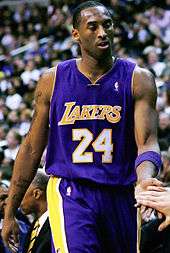
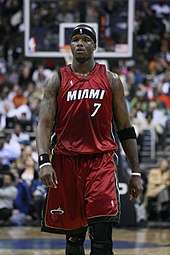
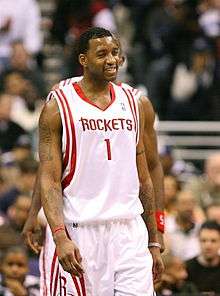

.jpg)
